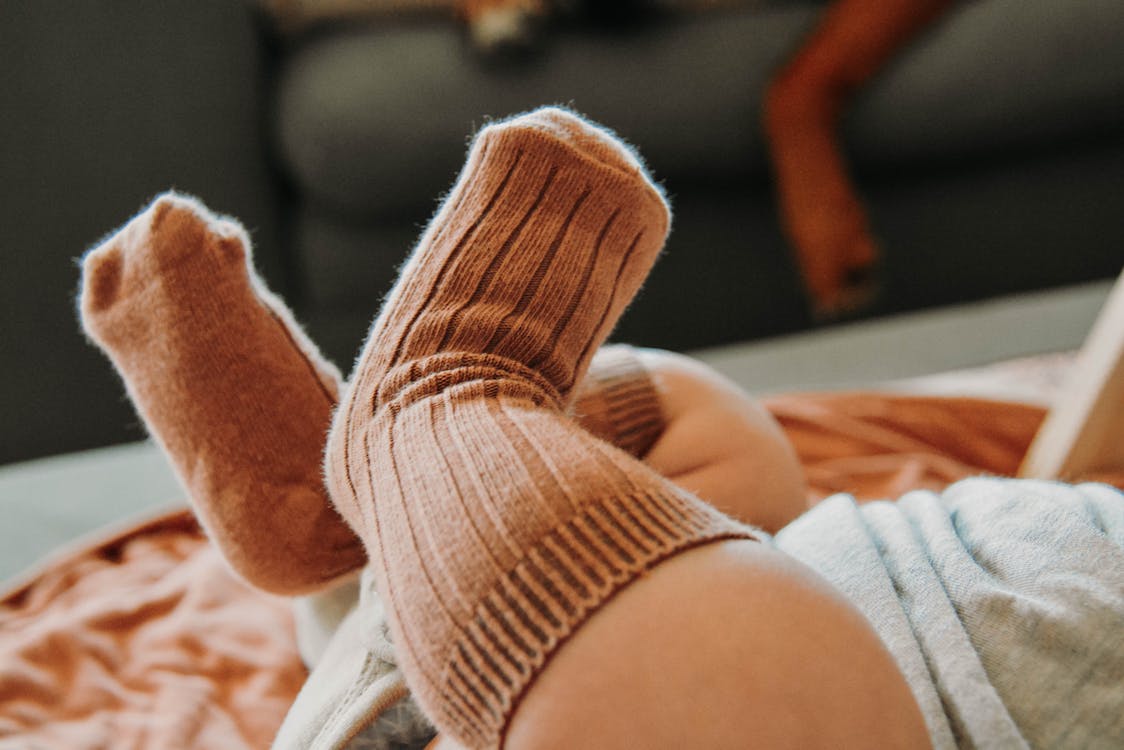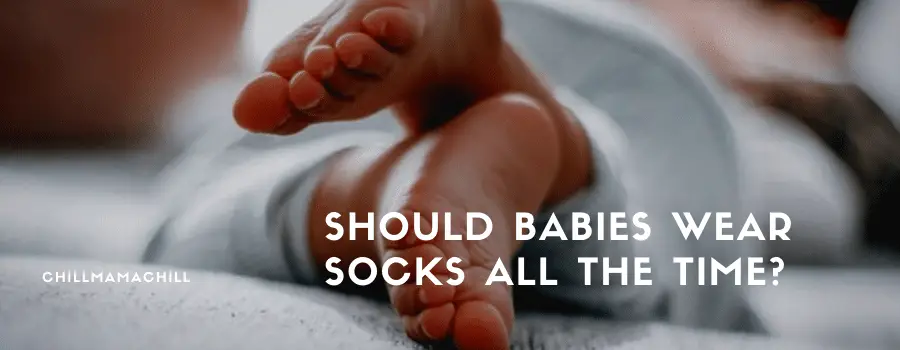I know there’s an adage on keeping a baby well wrapped up from head to toe at all times. That’s why you’re likely to frown at this suggestion of a baby not needing to wear socks all the time.
To answer the question, should babies wear socks all the time? I’ll say no. All you need to do is learn how to strike the right balance.
The thing is, there’s no contest here because you should always strive to keep your little munchkin as warm as possible. But there are instances where you’ll need to consider taking the socks off, especially in cool or warm weather. I’ve shared some detailed tips on striking this balance here below.
Why Should Babies Wear Socks All the Time?
Unlike us, babies are delicate and can’t regulate their body temperatures. That’s why if left uncovered, they lose heat quickly, notably from the head and feet first.

Besides keeping their feet warm, babies wear socks at all times to protect them from sunburn, frostbite, and general injuries. Their sensitive skin makes them easily prone to anything that’s even slightly abrasive.
One other thing, a baby must wear shoes with socks to help prevent skin friction with the shoes and absorb excess moisture,
All in all, baby socks don’t just complete an outfit. They’re valuable protection against cold weather, illness, and injuries.
When Should Babies Not Wear Socks?
If babies are this sensitive, doesn’t it prove they need to wear socks pretty much all the time? Not really.
As much as socks are valuable protection, they can also have adverse effects when worn all the time. Yes, I know it’s frustrating trying to figure out the do’s and don’ts, but being a mum is ongoing training.
I should know because I was an all-the-time socks mum with my first son now ten and second, a girl now six. Now with my youngest, a girl whose one, I know what to do, and here are the facts.
- Learn to observe your baby as they interact with their environment. Especially as they learn to walk and crawl, they rely on their natural senses. Leaving them without socks on contributes to their growth and development as they wiggle their feet, feel their toes, even taste them, and feel the ground beneath them.
- Constantly monitor your environment’s temperature because if it’s exceedingly hot, your baby runs the risk of getting overheated. The danger with overheating is heat rush and, at worst, Sudden Infant Death (S.I.D.), a leading cause of infant deaths. You can prevent overheating by reducing the layer of clothing, including socks.
- If you notice that your baby has outgrown their current pair of socks, it’s time to get new ones. Wearing tight socks hinders foot development and proper blood circulation and may cause sock line bands or hyperpigmentation. The sock line bands appear as ring marks or burns around the calves or ankles, leading to permanent scarring.
- Wearing socks all the time could also reinforce the idea that they need to have them all the time, limiting their progress. Some babies could insist on them even when not necessary, so along the journey, train your baby not to be overly attached to them.
How to Choose Baby Socks
Now that we’ve figured out how to strike a balance on whether babies should wear socks all the time, let’s focus on how to choose baby socks.
When choosing socks for your baby, remember that the right size and fabric matter most.
Therefore, you should only choose socks that fit and aren’t tight and irritating sensitive skin. Always go for socks with elastic tops in hypoallergenic, organic materials.
Babies keep pulling off socks, which can be frustrating, especially if the socks must stay on. I’ve discovered socks with catchy colors and cartoons will solve the problem in such situations.

If your concern is matchy-matchy outfits, opt for monochrome socks. But pay attention to the quality and type of material. The suitable material should be durable, soft, and elastic.
Not all materials are suitable for babies, so aim for natural ones like cotton, bamboo, and merino wool which are hypoallergenic, soft, and delicate to sensitive skin.
The fabric should also be tough to withstand constant rubbing and washing. For yarn socks, the best material is a blend of natural and synthetic as this helps prevent shrinkage.
Remember that even after choosing the best socks, what’s critical to your baby’s well-being is their usage. They must;
- Fit properly, and you can test by checking the ease of sticking a finger through the elastic top.
- Be clean socks at all times. Give your baby a clean change of socks as much as possible to prevent discomfort and illness.
- Be worn over dry feet. Before your baby wears the socks, ensure their feet are thoroughly dried off.
Frequently Asked Questions
Should Babies Wear Socks to Bed?
Babies should only wear socks to bed to keep them sufficiently warm and ensure they have a good night’s sleep. A good rule of thumb is to monitor the room’s temperature; ensure your baby wears socks if it feels cold to you.
Should Babies Wear Socks in Summer?
Temperatures are high in summer, which increases the risk of overheating if the baby wears socks. But to be sure, you should monitor temperatures, and if it feels pretty warm to you, then your baby shouldn’t wear socks.
Is It Better to Not Wear Socks?
No, because socks are a must-have baby wear accessory. Socks help to regulate a baby’s body temperature and keep them warm. Besides, they also help protect a baby from frostbite, sunburn, and general injuries.
Conclusion
That marks the end of my factual take on this topic; should babies wear socks all the time? While babies need to wear socks, they don’t have to do it all the time.
Socks are valuable protection from harsh environments that could be too much for their tiny delicate bodies. To enable their natural progression and adaptability, limit socks wearing to only critical situations.

I’m Cathrine and I’m a 39-year-old mother of 3 from Utica, New York. And I’m extremely happy you’ve come to visit my hide-out on the web. Here I post about everything related to family-life and usually it will involve babies and lessons I’ve learned over the years from experts, friends, and my own mistakes. So hopefully you will find what i write fun and informational!

